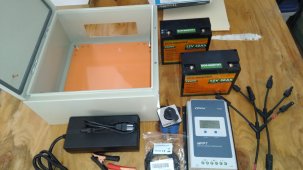So… I honestly have no idea what happened. This is a 120ah build of cheap aliexpress cells and a overkill BMS. I use a red arc 1225 charge controller to manage the 100w solar panel and alternator/starting battery To keep the cells charged. They have worked flawlessly for a year with delta between cells typically 0.02-0.05 and I think 3 recorded overvoltages, all of which I witnessed via the BMS Bluetooth app. My van has been sitting for 2 weeks with hardly any use and a 12v fridge consuming power so the batteries were discharged around 40% of the 120ah rating The day before. When I got in the van and checked the state of charge it read overvoltage disconnect and a fully charged system. This was odd as there is no way my little solar panel charged up those cells to 100% in a day and overcast skies. Ambient temp outside around 92F so it was a hot day bit the overkill temp sensors were showing 37-38C in the battery box. I drove to the store and watched the BMS to see if it would kick on charging again and it never did. Driving back home I heard a hiss and smoke immediately released into the vehicle. I pulled over and looked under the seat quick where the battery is and the smoke stopped. I checked the BMS and saw the voltage in cell 4 rapidly dropping while the other 3 remained stable. I used the BMS to disconnect the cells and drive home (3min drive). I got home and looked under the seat and saw the cell was significantly deformed and swelling and closee the box and immediately a loud bang and a ridiculous amount of “smoke” (fumes really)…. I ran for a fire extinguisher and was overcome by the fumes and the heat n the battery box and just called 911. Fire department came, put on respirators, and used a yellow powder fire extinguisher to stop the reaction or “put it out” and pulled the cells from the vehicle and that is essentially it. I have a number of fuses setup in the system and none were blown. Zero damage to the other cells and any of the components of the system. Just this one cell failed, cell #4.
In another forum, people are saying the casing on these cells is charged and say the cell was shorted out on the metal battery box Which I find ridiculous. Even if the cell was negatively charged, it’s already grounded to the car so contact with the metal box should not do anything in my estimation. If they are positively charged, I would assume this would be happening a LOT and all 4 cells, being connected by the bus bars, would have been damaged.
The cells were separated with very sticky foam tape and taped together… I believe I saw this done in one of Will’s videos?
I am all ears as to what you guys think happened or I need to do differently to prevent this again. I hope to replace the system as it was working awesome and way better than the lead acid i used to use.






